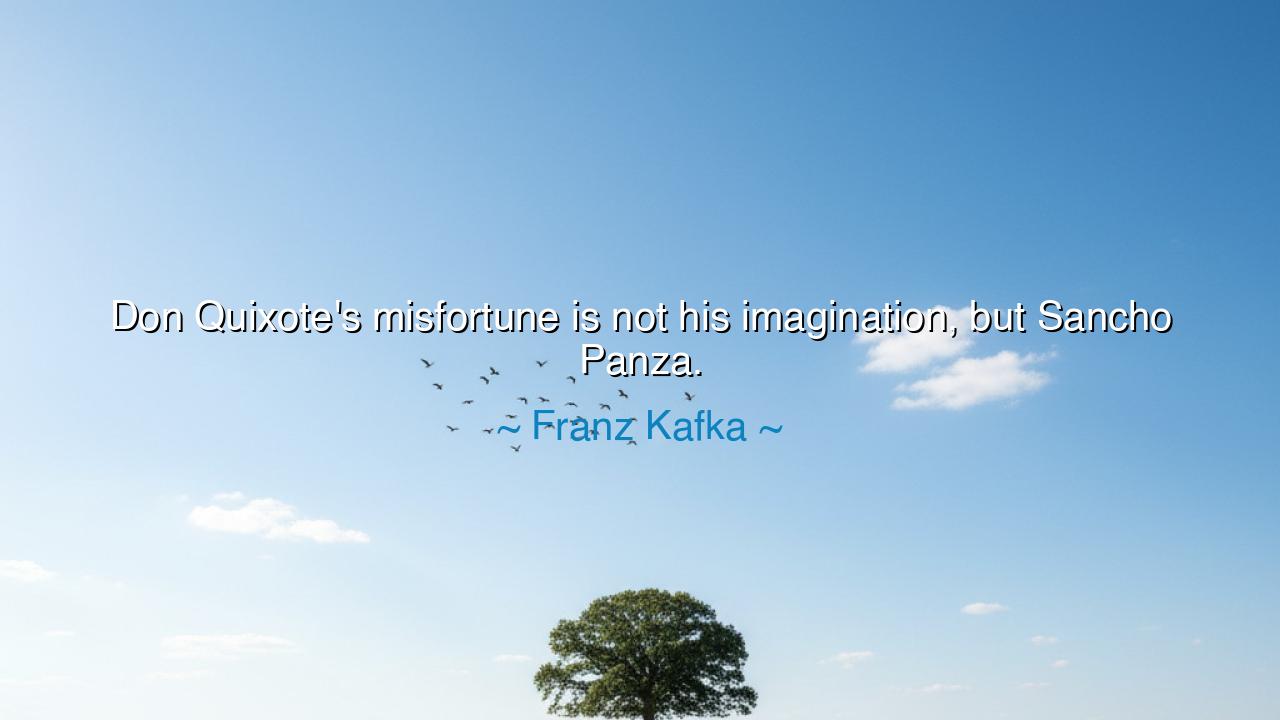
Don Quixote's misfortune is not his imagination, but Sancho






“Don Quixote’s misfortune is not his imagination, but Sancho Panza.” Thus wrote Franz Kafka, the great prophet of paradox and alienation, whose words often shimmer with mystery and shadow. In this cryptic reflection, Kafka turns his gaze upon the eternal figure of Don Quixote, the knight of impossible dreams, and his humble companion Sancho Panza. To many, Quixote’s folly lies in his imagination—in his belief that windmills are giants, that tavern girls are princesses, that a broken age can still be redeemed by chivalry. Yet Kafka, ever the seer of deeper truths, tells us otherwise. He declares that Quixote’s misfortune is not his dream, but the world—and within it, Sancho Panza, the voice of reality, practicality, and doubt.
The origin of this thought lies not only in Kafka’s fascination with Don Quixote, but in his own lifelong tension between the visionary and the mundane. Kafka lived in a world of bureaucracy and routine, yet within him burned a fire of imagination—visions of justice, transformation, and transcendence that could not fit within the narrow walls of ordinary life. Like Quixote, he dreamed of greatness; like Sancho, he was tethered to the earth. Thus, this quote can be read as the lament of all who live between two worlds—the world of imagination, which seeks to soar, and the world of reality, which drags us back to the ground. Kafka’s insight is not condemnation of Sancho, but recognition of the eternal conflict between dreamers and the systems that bind them.
In this light, Don Quixote becomes a symbol not of madness, but of courage—the courage to live according to imagination in a world ruled by reason. He is the soul that dares to dream beyond the limits of the possible. His imagination transforms the world around him, imbuing the ordinary with sacred meaning. Yet beside him stands Sancho Panza, the embodiment of the practical, the cautious, the sensible. Sancho loves his master, but he also restrains him. He mocks, doubts, and grounds him. He is the whisper of the world that says, “Be realistic. Do not dream too high. The giants you fight are only windmills.” And so, in Kafka’s reading, Quixote’s tragedy is not his delusion, but the weight of Sancho’s realism—the constant reminder that his vision will never be shared, that the world will not believe.
The misfortune of all visionaries throughout history has been this same burden. Consider the tale of Galileo Galilei, who saw the Earth not as the center of creation but as one planet among many, spinning in infinite space. His imagination, like Quixote’s, saw a world transformed—a universe vast and divine. Yet he was met with Sanchos in robes and crowns, who called him heretic, who demanded he deny what he knew to be true. Galileo’s misfortune was not his imagination, but the world that refused to follow it. So too with Vincent van Gogh, who saw fields alive with fire and sky, who painted the invisible soul of creation. His misfortune was not the brilliance of his vision, but the world’s blindness—the Sanchos who could not see beyond the visible.
Kafka’s insight is thus both sorrowful and wise: the dreamer’s tragedy lies not in dreaming, but in the resistance of the practical. For every Don Quixote, there are countless Sanchos who, though well-meaning, anchor the spirit to earth. Yet we must also see that Sancho is necessary. Without him, Quixote would die in his first charge. Without reality’s weight, imagination would lose its form. Kafka, the master of paradox, shows us that both must exist—but not equally. When Sancho leads, the spirit grows small; when Quixote leads, the world is reborn. The true misfortune comes when the dreamer forgets he is meant to lead his own destiny, and allows the cautious to steer his path.
O seeker of wisdom, take this teaching to heart: the world will always send you Sanchos—voices of reason, safety, conformity. They will warn you not to believe too much, not to reach too far, not to dream too deeply. Listen to them, but do not serve them. Let your imagination remain your master, your guiding star. For it is better to fall chasing the impossible than to survive in the gray comfort of the ordinary. The true madness is not to dream—it is to live without dreams, to quench the light of inspiration in the name of caution.
Therefore, let this be your lesson: honor your Quixote, but understand your Sancho. Let imagination lead, and let reason follow, but never the other way around. Do not fear to see the world as it might be; for though others may laugh, it is the dreamers who shape the ages, while the practical merely record them. As Franz Kafka reminds us, the misfortune of the dreamer lies not in his imagination, but in the world that cannot yet understand it. Yet still—dream. For in the act of dreaming, even against the laughter of Sancho, you keep alive the divine experiment of the soul, and the Universe, once more, shouts itself awake through you.






AAdministratorAdministrator
Welcome, honored guests. Please leave a comment, we will respond soon